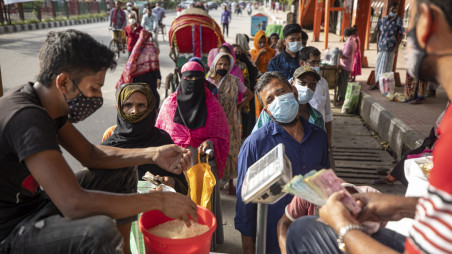Low-income people’s food, protein intake down in lockdown
Food security has been greatly compromised as 40% of low-income households have difficulties coming by three meals a day

Low-income people in the country have been struggling to afford three meals a day amid the Covid-19 pandemic, and most of their protein consumption has declined significantly due to poor financial conditions after the loss of jobs and thus no income.
Most of them have difficulties in buying fish, meat or even eggs – the main source of protein.
According to a study, "Covid-19 – Livelihood Crisis, Social Cohesion Challenges and Mitigation Options: An Empirical Study", published on 1 July 2021 by the Centre for Peace and Justice, Brac University, food security has been greatly compromised as 40% of low-income households face difficulties coming by three meals a day, 70% consumed less quantity of food and 87% reduced their protein consumption in Bangladesh.
The Business Standard recently talked to 100 people in seven shanty towns in the capital to determine how the pandemic has affected their food consumption pattern.
Street hawker Alam Hossain, who makes a living by selling towels and flowers in Karwan Bazar, has been starving on Wednesday noon since he had only one meal on Tuesday.

He is worried about how to go through the remaining days of the lockdown. Since vehicular movements are suspended, it is not possible to sell his wares on the streets. He cannot afford to hawk anything new.
"I used to sell flowers and towels to people when cars were stuck in traffic jams and earn Tk200-300 a day. There is no income in the lockdown. I have no savings either. Neither the government nor any other organisation has helped us in the pandemic. With a family of eight, I cannot eat even once a day, let alone buy fish or meat," a pale Alam said in sheer distress.
Physically challenged Badsha Mia, a father of six children, sells tea and cigarettes on the sidewalk in Karwan Bazar. His sales have completely come to a halt in the repeated lockdowns. Having no other way of earning, he has started begging on the streets.
"We have been starving for three days. Moreover, I have house rent due to the tune of Tk24,000. We used to eat three meals a day when my shop was open but at present, we have our only meal at noon. If I can earn something by begging I buy some biscuits for my children," said Badsha.
Building demolition worker Md Miraj lives in a slum in the capital with his family. He does not have any money to buy milk for his three-year-old child. The family has been having one or two meals – rice with mashed potatoes or pulses – a day.
"I have borrowed Tk40,000 in the Covid-19 epidemic. I bought fish six months ago. If it continues like this, we will have to starve to death," said Miraj.
Conditions are similar for the families of painter Ibrahim Khalil, fuchka seller Mohammad Zakir and tea seller Rasheda Akhter. Their income has stopped and they are struggling to survive through the days. Some of them borrowed money from their relatives but no one wants to lend money now. Their house owners are also creating pressure on them to clear their house rents.
They said they cannot buy fish or meat. Sometimes, they buy broken eggs at a lower price from egg sellers and this is the only source of protein for them.

Meanwhile, many people have changed their profession in the hope of managing a living. For example, Md Ershad, who used to drive a private car, now sells fruits.
"My income has gone down a lot so our food consumption has also decreased. As I have changed my profession, I am struggling to cope with the situation. Even though it is difficult, I can feed my family three times a day. However, we have to eat vegetables more than fish and meat," said Ershad.
Like Ershad, mobile accessories businessman Shahabuddin Ahmed now sells fruits in Khilgaon and consumer product seller Abdul Gafur is selling vegetables in the capital.
A nationwide survey conducted by Brac from 31 March to 5 April found that 14% of people have no food at home. And the extreme poverty rate has increased by 60% compared to earlier.
Dr Ahsan H Mansoor, executive director of the Policy Research Institute, a private research institute, said about one crore low-income people have been affected by the pandemic. The number will amplify if lockdowns continue like this. The government should give these people Tk2,000 on a monthly basis and for at least 12 months so that they can survive.



 Keep updated, follow The Business Standard's Google news channel
Keep updated, follow The Business Standard's Google news channel
















